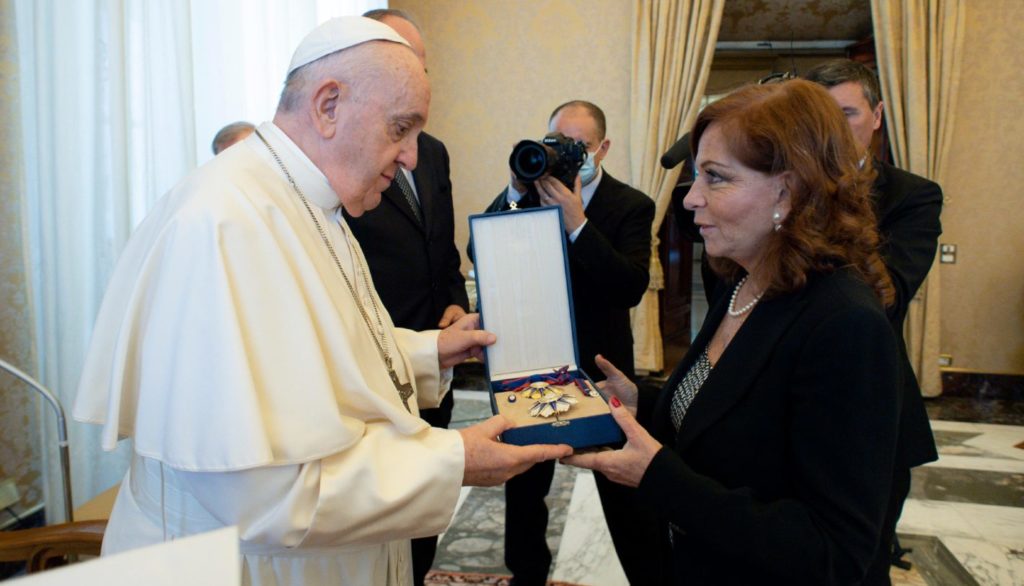For the first time in the history of the Holy See, two journalists received from the hands of Pope Francis, on November 13, the Grand Cross of the Piana Order, which is usually awarded to heads of state. They are Valentina Alazraki, of Mexican television Televisa, and Phil Pullella, of Reuters, professionals who have been covering the Vatican for several decades. Both are, in fact, "deans" of the so-called "Vaticanists", the group of journalists who live in Rome and follow daily all the activities of the Vatican and the Holy See, and fly with the Pope on his international trips around the world. Alazraki, for example, has made more than 150 trips following the last three pontiffs.
For the occasion, the Holy Father addressed a message to the entire community of information professionals, of whom a representation was present in the room, to tell them that with this honor he intended to "pay homage to your entire working community", as well as to show "that he loves you, follows you, esteems you, considers you precious".
On this occasion, Pope Francis gave a short lesson in journalism, recalling the fundamental elements that characterize - or should characterize - a profession truly at the service of good and truth, lived as a natural "mission" of "explaining the world", "making it less obscure", so that "those who live in it may be less afraid of it and look at others with greater awareness, and also with greater trust".
This true vocation must be based on three important pillars. Firstly, listening to the protagonists of the stories being told, which also means seeing, being there, to capture nuances and sensations through a necessary "irreplaceable" personal encounter.
The second pillar refers to in-depth analysis, to the ability to penetrate the context of situations in order to avoid simplification and contrast, very much in vogue today in the media and web landscape.
Finally, telling, which does not mean "putting oneself in the foreground, nor setting oneself up as a judge", but acquiring the attitude that leads to "allowing oneself to be hit and sometimes hurt by the stories we encounter, in order to be able to narrate them with humility to our readers".
The Pope's wish, therefore, is to deal with journalists and communicators "who are passionate about reality, capable of finding the treasures hidden in the folds of our society and of telling them, allowing us to be impacted, to learn, to broaden our minds, to grasp aspects we did not know before".
This ability to empathize with people's problems, to grasp the elements of truth, to contextualize them and to relate them with kindness also applies to all events related to the Church, which "is not a large multinational company run by managers studying at the table how best to sell their product", but was born and exists "to reflect the light of Another, the light of Jesus".
Pope Francis is no stranger to giving useful indications to journalists so that they can better fulfill their delicate task of service. Very often, in speeches, interviews, messages and greetings, he has highlighted some of his "communicative convictions" and "virtuous advice" as a remedy to what he has defined on some other occasion as the "sins of the media." Among them are disinformation, slander and defamation.
In the face of these "violations of truth," the Pontiff has reiterated on several occasions the need to prioritize the love of truth, goodness and beauty, an "existential triad" as he defined it in his first audience with journalists once elected in 2013.
Listening is also part of that "proximity and culture of encounter" typical of other pronouncements of his Magisterium, aware that personal involvement thus becomes the very root of the communicator's reliability.
In all this arises responsibility, the attitude that leads to maintain a high ethical level in the work, avoiding superficiality and always being respectful with people, both with those who are the object of information as well as with those who receive the message.
The Pope also speaks of hope, referring to a type of information and communication that is constructive. In the face of defeatist or pessimistic views, the right attitude-which is a task and also a commitment-must be positive, leaving room for the good things that happen.
Finally, the Pope is aware that the nerve centers where most of the news is concentrated are in the big centers. However, this should not make us forget the countless stories of those who live far away, at a distance, in the now famous suburbs, where alongside the suffering and degradation there are certainly stories of great solidarity, which can help everyone to look at reality in a renewed way.









